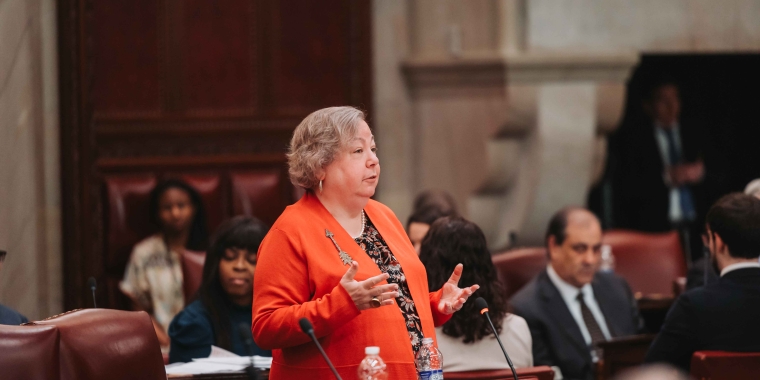
Governor Signs Senator Krueger's Tenant Protection Act
December 3, 2019

Albany - Today Governor Cuomo signed the Tenant Protection Act of 2019, S.2605, an Attorney General's program bill carried by Senator Liz Krueger. The new law will hold New York’s most unscrupulous landlords criminally accountable for tenant harassment.
"Over the years I have heard far too many horror stories from my constituents about the harassment they have suffered at the hands of unscrupulous landlords trying to drive them out of their homes," said Senator Krueger. "Up until now, it was nearly impossible for criminal charges to be filed against even the worst offenders. It is high time this law was updated to protect tenants and give them a fighting chance, and to safeguard our dwindling stock of affordable housing. I thank Governor Cuomo for signing this important tenant protection bill, Attorney General James for her leadership on this issue, and Assembly Member Joseph Lentol, who carried this legislation in the Assembly. "
Under the existing Harassment of a Rent Regulated Tenant statute, a prosecutor must not only prove that the offending landlord intended to cause the tenant to vacate their home, but also that the tenant sustained physical injury due to the landlord’s actions and that the landlord intended to cause (or acted with criminal recklessness in causing) such injury. This creates an inexplicably high bar that – in the nearly two decades since the law was enacted – has never been met. Analysis of NYS Division of Criminal Justice Services data performed by the Attorney General's office shows that not a single landlord has ever been convicted of the crime of Harassment of a Rent Regulated Tenant.
The Tenant Protection Act sets a more reasonable standard that eliminates the need to prove physical injury to a tenant, and opens the door to prosecutions arising out of more commonplace and insidious tactics -- such as turning off heat and hot water, exposing tenants to hazardous materials, and making rent-stabilized buildings deliberately uninhabitable for current tenants and their families.
Among other things, the Tenant Protection Act would:
- Create a new class A misdemeanor that would apply to landlords and their agents who, with the intent to induce a rent regulated tenant to vacate their home, engage in a “course of conduct” that: “impairs the habitability” of the housing accommodation; creates a condition that endangers the health or safety of the tenant; or is reasonably likely to, and does in fact, “interfere with or disturb the comfort, repose, peace or quiet” of such tenant in the use of their home;
- Expand the existing class E felony Penal Law offense to also make it unlawful for landlords or their agents, with the intent to induce two or more tenants in different rent regulated units to move out, to engage in a “systematic ongoing course of conduct” that: “impairs the habitability” of the housing accommodations; creates a condition that endangers the health or safety of one or more of the tenants; or is reasonably likely to, and does in fact, “interfere with or disturb the comfort, repose, peace or quiet” of one or more of such tenants in the use of their homes; and
- Make it a class E felony for a landlord to commit the new class A misdemeanor offense after he or she has been convicted of that crime or the class E felony tenant harassment offense within the preceding five years.
The new class A misdemeanor carries a maximum penalty of up to one year in jail. The class E felony carries a maximum sentence of up to four years in State prison.
###


